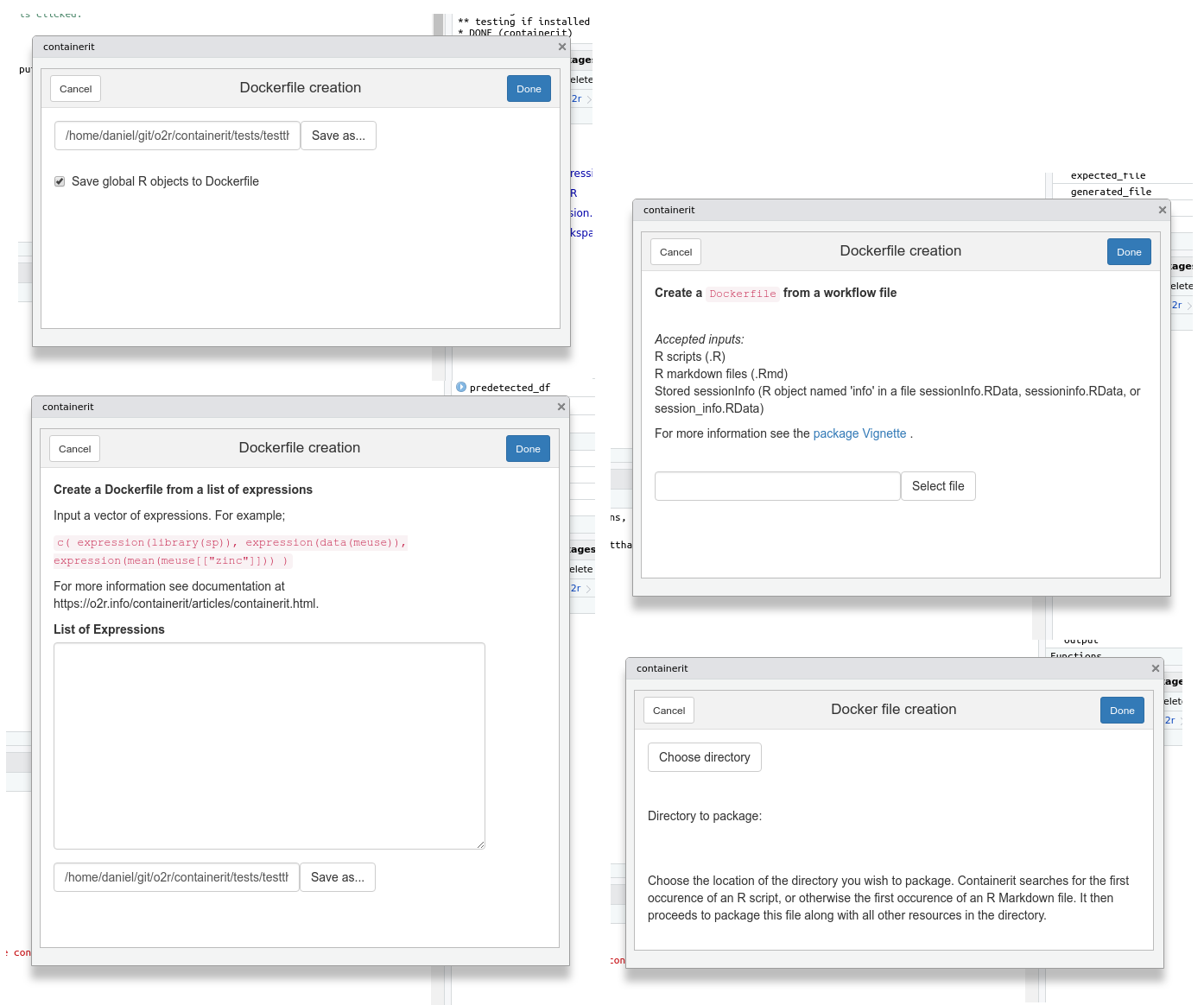Awesome
<!-- README.md is generated from README.Rmd. Please edit that file! -->containerit <img src="man/figures/logo.png" align="right" alt="containerit logo" width="200" style="padding: 0 0 10px 10px;" />
<!-- badges: start -->
<span class="altmetric-embed" data-badge-popover="bottom"
data-badge-type="2" data-doi="10.21105/joss.01603" data-condensed="true"
data-hide-no-mentions="true"></span> <!-- badges: end -->
containerit packages R script/session/workspace and all dependencies
as a Docker container by automagically generating
a suitable Dockerfile. The package’s website is
https://o2r.info/containerit/.
Prerequisites
containeritonly fully works if you have Docker installed and is only tested with Docker Engine - Community (previously called Docker Community Edition or Docker CE).R (>= 3.5.0)is needed so that some dependencies (e.g. BiocManager) are available; older versions of R predate the development of the package and were never tested.
Quick start
Try out containerit in a container
You can spin up a Docker container with containerit pre-installed if
you want to try out the package. The default of the containerit
images on Docker Hub is to start plain R, but you can also
start an with RStudio
session in a browser.
Note: The geospatial variant is used so that examples from
containerit vignettes are likely to work. For a minimal Dockerfile
to run containerit, see inst/docker/minimal/Dockerfile.
docker run --rm -it -e PASSWORD=o2r -p 8787:8787 o2rproject/containerit:geospatial /init
Now go to http://localhost:8787 and log in with the user rstudio and
password o2r. Continue in section Use.
Install
Installation is only possible from GitHub:
# install.packages("remotes")
remotes::install_github("o2r-project/containerit")
Use
containerit can create Dockerfile objects in R and render them as
Dockerfile instructions based on session information objects or
runnable R files (.R, .Rmd).
suppressPackageStartupMessages(library("containerit"))
my_dockerfile <- containerit::dockerfile(from = utils::sessionInfo())
#> INFO [2021-06-25 11:10:38] Created Dockerfile-Object based on sessionInfo
print(my_dockerfile)
#> FROM rocker/r-ver:4.1.0
#> LABEL maintainer="daniel"
#> WORKDIR /payload/
#> CMD ["R"]
You can disable logging:
futile.logger::flog.threshold(futile.logger::ERROR)
Now we create a Dockerfile for a specific R version and a given R
Markdown file. The option filter_baseimage_pkgs is used to not add any
packages already available in the base image, which can save a lot of
build time.
rmd_dockerfile <- containerit::dockerfile(from = "inst/demo.Rmd",
image = "rocker/verse:3.5.2",
maintainer = "o2r",
filter_baseimage_pkgs = TRUE)
#> Detected API version '1.41' is above max version '1.39'; downgrading
#> Detected API version '1.41' is above max version '1.39'; downgrading
print(rmd_dockerfile)
#> FROM rocker/verse:3.5.2
#> LABEL maintainer="o2r"
#> # CRAN packages skipped because they are in the base image: knitr
#> RUN ["install2.r", "fortunes"]
#> WORKDIR /payload/
#> CMD ["R"]
For extended instructions, see the vignettes at in the directory
vignettes/, which are readable online at
https://o2r.info/containerit/articles/.
Images
Images are available starting from different base images. All images are also available with version tags.
The Dockerfiles are available in the directory
inst/docker/Dockerfile.
verse
docker inspect o2rproject/containerit
Base image: rocker/verse:4.0.5
geospatial
docker inspect o2rproject/containerit:geospatial
Base image: rocker/geospatial:4.0.5
RStudio Add-in
RStudio Addins allow to
create interactive user interfaces for the RStudio development
environment. Courtesy of a great contribution by a group of
enthusiasts
at the ROpenSci OZ Unconference
2018, there are several forms to
quickly create Dockefiles from different use cases, e.g. the current
session, a vector of expressions, or a script file.

Contribute
All help is welcome: asking questions, providing documentation, testing, or even development.
Please note that this project is released with a Contributor Code of Conduct. By participating in this project you agree to abide by its terms.
See CONTRIBUTING.md for details.
Development
r-hub builder is great for running checks, e.g. before submitting to CRAN and on other operating systems.
library("rhub")
rhub::check_for_cran()
rhub::check_on_windows()
You can build the pkgdown site with
pkgdown::build_site()
You can build the Docker images locally with the current development version using the following commands.
docker build --tag containerit:dev --file inst/docker/Dockerfile.local .
docker build --tag containerit:geospatial-dev --file inst/docker/geospatial/Dockerfile.local .
You can use pre-commit
hooks to avoid some
mistakes.
A codemeta file, codemeta.json, with
metadata about the package and its dependencies is generated
automatically when this document is compiled.
codemetar::write_codemeta(".")
#> Added codemeta.json to .Rbuildignore
#> codemetar has the highest opinion of this R package :-)
Citation
To cite containerit in publications use:
Nüst, D. and Hinz, M. (2019). containerit: Generating Dockerfiles for
reproducible research with R. Journal of Open Source Software, 4(40),
1603, https://doi.org/10.21105/joss.01603
A BibTeX entry for LaTeX users is
@Article{,
title = {{containerit: Generating Dockerfiles for reproducible research with R}},
author = {Daniel Nüst and Matthias Hinz},
journal = {{Journal of Open Source Software}},
year = {2019},
month = {8},
volume = {4},
number = {40},
pages = {1603},
doi = {10.21105/joss.01603},
url = {https://doi.org/10.21105/joss.01603},
}
License
containerit is licensed under GNU General Public License, version 3, see file LICENSE.
Copyright (C) 2019 - o2r project.





